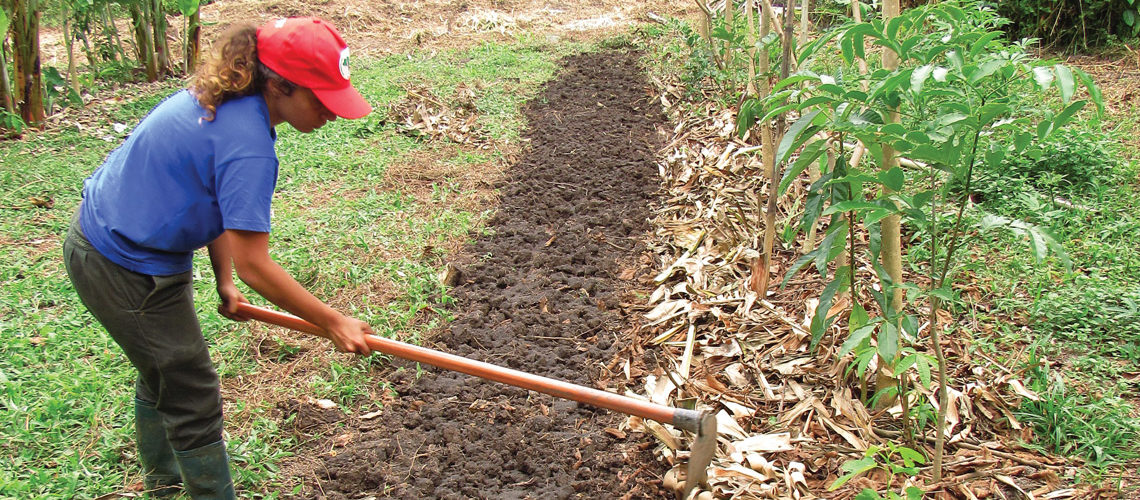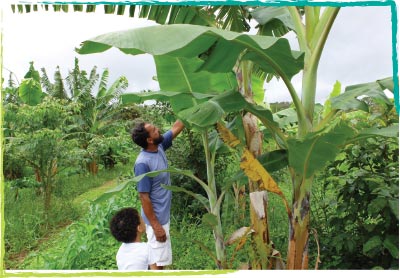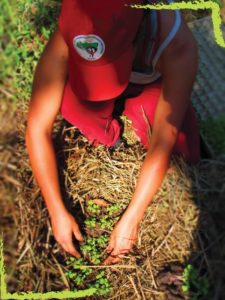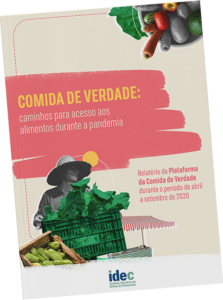
A contribution by IDEC
IDEC is a non-profit and independent consumer association with a mission to guide, raise awareness, defend ethics in consumer relations and fight for the rights of consumer-citizens. Based in São Paulo with representatives in Rio de Janeiro and Brasilia.


A systemic approach to syndemic problems
Discussions around sustainability permeate and interconnect different fields, including food systems. Despite the complexity and diversity of views that surround the topic, there is at least one consensus: the hegemonic food system has been unable to guarantee health and sovereignty to people nor does it respect planetary boundaries. It needs to change – urgently and radically.

Father and son from a Community-Supported Agriculture scheme visiting the pesticide-free production site in the Center-West of Brazil. Credit: CSA Veredas
This consensus has been made evident in reports and publications by the most respected organizations and institutes. We highlight two valuable contributions made by The Lancet research committees, which help us to reflect on the predatory impacts of how we produce and consume. They are the ‘Global Syndemic’1 triggered by the junction of three pandemics: obesity, malnutrition and climate change, which interact with and feedback into each other and ‘Food in the Anthropocene: healthy diets through sustainable food systems’.2
The latter illustrates the causal relationship between increasing mass consumption of meat and animal products, supported by increased production of animal feed, and consumption of ultra-processed products and worsening health outcomes, greenhouse gas emissions and biodiversity loss.

Farmers plant a ‘muvuca’ (assortment) of tree seeds and green manure vegetable seedlings as part of an agroforestry initiative in South Brazil. Credit: Muvuca Agroflorestal
Different countries, but especially those in the Global South, have been dealing simultaneously with lack of access to food and excessive exposure to unhealthy products, in a context of escalating climate change. These global fractures are visible in our country realities. In Brazil, for example, 9% of the population is hungry while 26.8% of the adult population is living with obesity.
In addition, agriculture and land use account for 23% of greenhouse gas emissions, caused by deforestation, animal husbandry and the use of chemical agricultural inputs, associated with the reduction of biodiversity. But it is about more than numbers, we are talking about people and a society that is suffering from the consequences of this production and consumption model.
It is from this lens that IDEC makes a call to structurally and systematically confront “political inertia” and profoundly transform food systems into those designed for the community, guaranteeing rights and social and climate justice.
This political inertia is understood as the set of harmful products and practices of the food industries, especially pesticides and ultra-processed products enabled by the absence of effective global and national governance structures.
The double burden of ultra-processed products: diseases and poisons
At the end of 2019, based on the Lancet research committee’s evidence of a correlation between the consumption of ultra-processed products and obesity and non-communicable chronic diseases, IDEC decided to investigate whether these products were also contaminated with pesticides. It seemed likely as they are largely composed of agricultural commodities such as soybeans, corn, wheat and sugar cane that receive most pesticide applications in the field.
We selected 27 products from different brands, divided into 8 categories: soft drinks, juices, soy drinks, breakfast cereals, packaged snacks, salt biscuits, stuffed biscuits and wheat bread. With the exception of the first two categories, we found pesticide residues in all other 6 categories.
Of the total, 59.3% of the products had residues of at least one pesticide and 51.8% had residues of glyphosate and glufosinate, the most used agricultural chemical used in Brazil and in the world. It is classified as potentially carcinogenic to humans. Even after a long process from harvesting, transporting, intensive industrial processing to shelf life in supermarkets, pesticide residues remain in consumer products.
There are no simple solutions to complex problems.
Given the magnitude of the challenges, different actors in society can, and should, put themselves at the service of the necessary transformations.
We warn though that reductionist approaches and practices will continue to perpetuate food system structures that generate inequalities, diseases and environmental hazards. These approaches tend to portray food as a commodity or as an individual responsibility instead of as a human right.
It is important, however, that we have concrete elements to analyse specific situations. IDEC’s research builds on a vast body of evidence linking consumption of ultra-processed foods with obesity and correlated diseases.
Through the confirmation that pesticide residues are present in these products, we make visible a relationship between them and a production system that generates negative environmental and social externalities.
Our work in this regard reinforces the need for a shift in public policies to promote truly healthy and sustainable food systems produced by people and for people.
Co-creating a sustainable future
We need to use different approaches to promote the transition to the world we want. Street fairs – especially the ones marketing organic foods – are vivid and vibrant environments that gather producers and consumers in a culture of exchange. The transactions that occur at street fairs are far more than commercial in nature – they are relationship-building transactions that pave the way for dialogue about the issues that matter. The nature of the space, which transcends the asymmetrical power relationships found in formal retail outlets and malls, and the organic nature of the goods on offer align with the values of wellbeing, sovereignty and sustainability. IDEC identified these spaces as key intervention points for a communication platform in the form of a searchable map that would address several food and nutrition-related challenges in Brazil. We have mapped more than 1,000 initiatives all over Brazil. More than 1.5 million people have accessed the map. We do this work in partnership with civil society organisations and stakeholders from the different states and municipalities as well as consumers, farmers and fair owners from all over the country. These direct linkages are critical to the emergence of a sustainable food system – one in which producers are valued for the work that they do to produce food in a way that does not harm the planet and where consumers are able to access healthy food affordably. It therefore serves both ecological and social justice needs.- Swinburn, B. et al. 2019. The Global Syndemic of Obesity, Undernutrition, and Climate Change: The Lancet Commission report. ‘Lancet’ 393(10173):791-846. DOI: 10.1016/S0140-6736(18)32822-8
- Willett, W.M.D. et al. 2019. ‘Food in the Anthropocene: the EAT–Lancet Commission on healthy diets from sustainable food systems.’ JDOI: https://doi.org/10.1016/S0140-6736(18)31788-4

